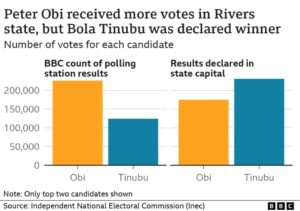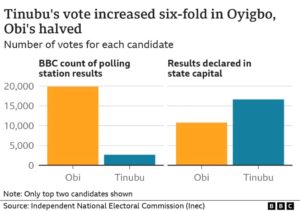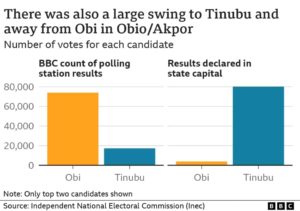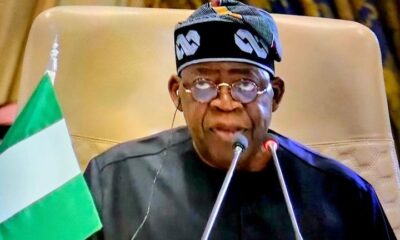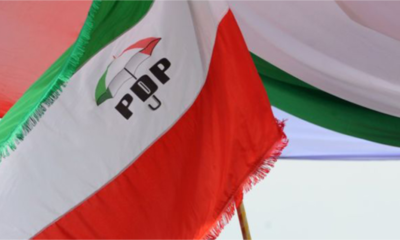Politics
BBC Exposes Election Discrepancies In Rivers State Presidential Election Result
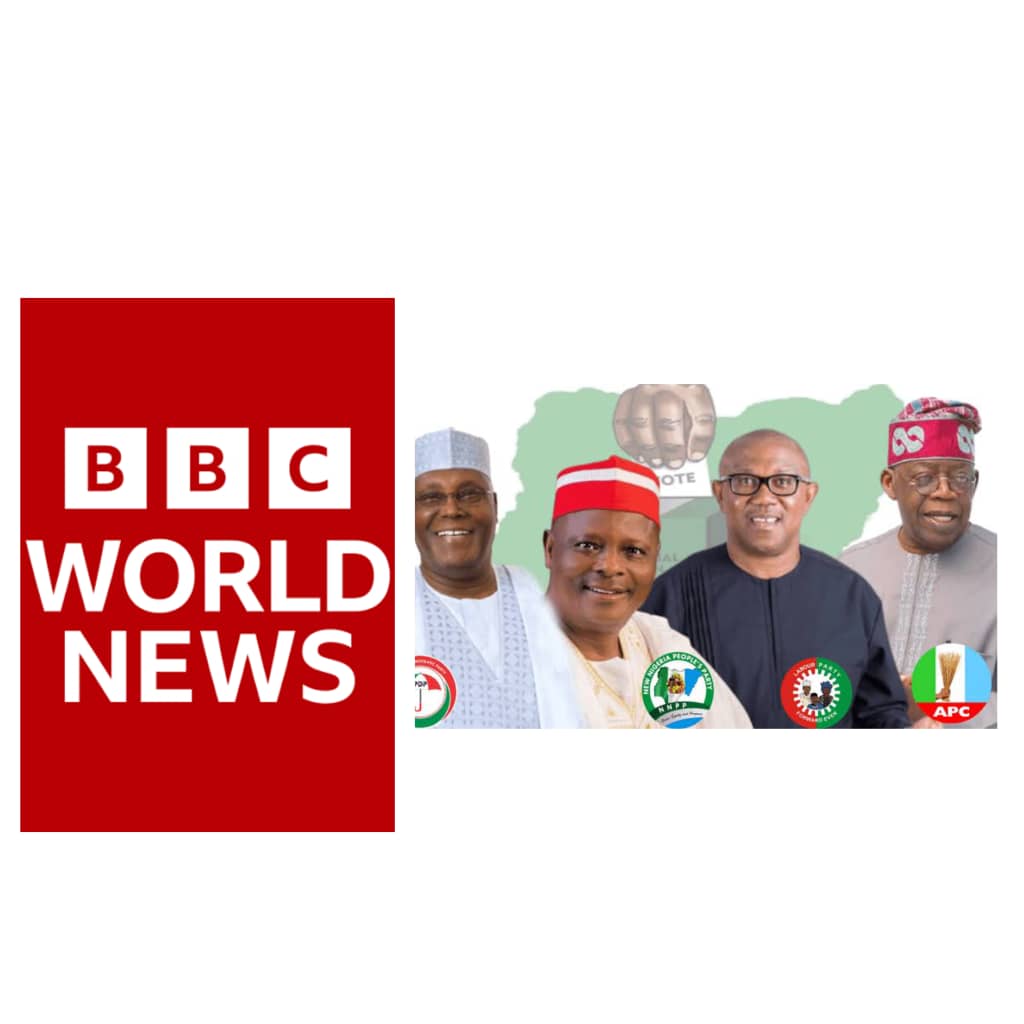
An investigation conducted by the BBC has revealed potential indications of manipulation in Nigeria’s presidential election results.
Bola Tinubu, the declared winner, is scheduled to be inaugurated on 29 May; however, the opposition is contesting this outcome.
The BBC’s findings have identified notable irregularities in Rivers state, a crucial contested region, although these irregularities are not substantial enough to alter the overall national result of the election that occurred in February.
Additionally, concerns have arisen regarding the identity of an election official who announced certain unexplained results.
According to BBC, After meticulously analyzing the voting tally sheets from more than 6,000 polling stations in Rivers state, where numerous complaints from the opposition were concentrated, a discrepancy has emerged.
They alleged that the official results in this particular state indicated a decisive majority in favor of Bola Tinubu from the ruling All Progressives Congress (APC).
However, upon their own calculations, it appears that Peter Obi of the Labour Party (LP) had garnered the highest number of votes in the state, surpassing Tinubu by a significant margin.
The investigation has alleged that there was a notable increase of approximately 106,000 votes in Mr. Tinubu’s official declaration compared to the tally obtained from our polling station analysis.
This increase nearly doubled his overall vote count in the state. Conversely, Mr. Obi’s vote count had decreased by over 50,000 in comparison.
They emphasized that despite conducting a thorough search on the election website for all 6,866 polling stations in Rivers state, complete results were not obtainable. Some results were incorrectly uploaded or missing even after a month had passed since the polling date.
Additionally, for approximately 5% of the polling stations, the photos of the tally sheets were too blurry to decipher according to the investigation.
Furthermore, the investigation uncovered that in an additional 17% of polling stations, no results were available at all. This could be attributed to various reasons, such as security concerns or the failure of voting materials to arrive. Technical difficulties also hindered officials from uploading the required documents.
It is evident that the final official results would have included more polling stations than those considered in the BBC investigation.
However, these additional tally sheets would have increased the vote totals for each party, rather than decreasing them.
Surprisingly, the investigation revealed that there was a significant decline in votes for Peter Obi’s Labour Party in Rivers state as indicated by the official result.
The question remains: How can the sharp decrease in Peter Obi’s votes, as reflected in the official result, be explained given the circumstances?
Two specific areas drew notable attention during the investigation. The first was the Oyigbo local government area where the officially announced results indicated that Bola Tinubu’s vote count was six times higher compared to the BBC’s tally from the polling stations and In contrast, Peter Obi’s votes had been reduced by half according to the official results.
The second local government area that the BBC investigation identified as having major discrepancies was Obio/Akpor, located in close proximity to Oyigbo. The investigation revealed that the official result for Mr. Tinubu showed a vote count of 80,239, while the BBC counted just 17,293 votes from the polling station tallies.
Conversely, the official count for Mr. Obi was only 3,829 votes, whereas the BBC’s tally sheets indicated a staggering 74,033 votes for him.
According to the BBC, all the polling station sheets were collated at the local government (LGA) headquarters.
During the investigation, the BBC team discovered an official election document that contained the collated votes for the Oyigbo area.
The document was signed by an election official and several party agents, indicating its authenticity and credibility.
According to the investigation, Multiple photographs of the document were taken and shared on various social media accounts. The numbers recorded in this document closely aligned with the BBC’s own tallies for the two leading candidates, Obi and Tinubu.
It further States that the document was likely one of the 23 collation sheets from the local government areas (LGAs) in Rivers state, which were taken to the state capital, Port Harcourt, for the official declaration of results.
According to them, The official announcement took place on 27 February and was broadcast live on television.
Dr. Dickson Ariaga, the election official from Oyigbo, introduced himself and stated that he worked for the Federal College of Education in Omoku.
Although the word “Omoku” on the recording is unclear, it is important to mention that there is only one Federal College of Education in Rivers state.
Dr. Ariaga proceeded to read out the results for each party in alphabetical order, including the smaller parties. This recording provides additional evidence regarding the announcement of the results in Oyigbo.
During the live announcement, according to BBC, it was observed that the numbers mentioned by Dr. Ariaga did not align with the figures recorded on the collation sheet obtained by the BBC.
Specifically, when he reached Mr. Tinubu’s APC, instead of stating the figure of 2,731 as seen in the photograph of the sheet, he announced a significantly higher number of “16,630.” Similarly, for Mr. Obi’s party (LP), the announced figure differed from the number on the sheet.
Instead of the recorded 22,289 votes, Dr. Ariaga declared “10,784,” which resulted in more than halving Obi’s vote count.
Despite the BBC’s efforts to obtain further information and clarification, the electoral commission declined to provide the details of Dr. Ariaga or facilitate an interview with him on the matter.
However, the BBC managed to speak with the election official who was seated next to Dr. Ariaga during the announcement. Unfortunately, she stated that she was not authorized to speak to the press.
To gather more information, a reporter from the BBC was sent to the Federal College of Education in Omoku, located approximately two hours north of Port Harcourt, where Dr. Ariaga claimed to work during his introduction. The Deputy Provost, Moses Ekpa, was interviewed by the BBC.
He stated that based on their records, including payroll and human resources, there is no individual by the name of Dr. Ariaga in their system, and they have no knowledge of such a person being associated with the institution.
He said “From our records, both from our payroll and from our human resources, there is no such a name in our system and we don’t know such a person.”
In an attempt to track down Dr. Ariaga, the BBC conducted a search on social media platforms and came across another Facebook account bearing the name Dickson Ariaga, which listed Port Harcourt as the location.
To verify the connection, the BBC utilized Amazon Rekognition software to compare an image from this account with television footage of Dr. Ariaga. The software indicated a match of 97.2%, suggesting a high probability that they are the same individual.
Despite attempts to contact Dr. Ariaga through this Facebook account, he did not respond to the messages sent by the BBC. However, the BBC managed to reach out to some of his Facebook friends in an effort to gather more information.
Eventually, they were able to speak to a man who claimed to be a relative of Dr. Ariaga. Initially, he expressed willingness to assist the BBC, but later on, he did not return their calls, leaving the investigation with unresolved leads.
Upon presenting these findings to Nigeria’s Independent National Electoral Commission (INEC), the BBC received a response from Johnson Sinikiem, Inec’s regional spokesman in Port Harcourt. Sinikiem explained that due to a “gross shortage of time and personnel,” there were instances where individuals were employed without proper verification of their identity documents.
Regarding Dr. Ariaga specifically, Sinikiem acknowledged that if Ariaga had presented himself as a lecturer from the college in Omoku, but it turned out to be false, then he would be considered dishonest.
He said “If he had presented himself as a lecturer from [the college in Omoku] and it’s otherwise, then he is dishonest.”
In addition to seeking a response from Inec’s regional spokesperson, the BBC also approached Inec’s headquarters in Abuja regarding the discrepancies found in the results in Rivers state. However, the response received was that they were unable to comment on the matter due to ongoing legal challenges.
The case highlighted by the BBC investigation in Rivers state is just one example that raises concerns about potential manipulation of election results.
However, the search for Dr. Ariaga continues as the BBC awaits his response to the findings presented in their report. Obtaining his perspective and clarifications could provide valuable insights and contribute to a better understanding of the situation.
@BBC News (World)
Politics
Leadership Newspaper Backs Adeleke For Second Tenure, Names Him ‘Gov Of The Year’

It was a plethora of pleasantries in Osogbo on Thursday, when Osun State Governor, Senator Ademola Adeleke was named 2024 Governor of the year and endorsed for second tenure in office by the top management of the Leadership Newspaper.
The newspaper’s team was on a courtesy call on Gov Adeleke, Biztellers reports.
Receiving them at the Government House, Gov Adeleke noted that his administration had reduced the infra deficit by over 40 percent.
He added that his administration had also bridged access to primary health care, with an ambition to expand health access at medium and tertiary levels.
He said, “Osun State is constantly getting recognitions for what outsiders and even opposition members regard as our commendable performance.
“In the last one year, our government has been conferred with several awards across the sectors. Aside from reputable newspapers like the leadership stable, we have received accolades from several federal agencies and non-governmental bodies. The consensus from those reviewing our performance and service delivery is that we are true agents of good governance.
“In all these positive ratings, my response has always been to task my team to double their efforts. In the face of overwhelming positive reviews and high approval ratings, I am compelled to drive my team harder. When recently, some opposition figures confessed to our positive ratings, I still believe we have a lot of grounds to cover.
“I am not allowing the praises to enter my head. While it may be true that I have delivered a four-year task in under two years, I am propelled to do more because Osun has been left behind on many fronts. As I have reduced the infra deficit by over 40 percent, my real target Is higher. As I have bridged access to primary health care, my ambition is to also expand health access at medium and tertiary levels. While our records across the sectors are laudable as your newspaper has acknowledged, the ultimate goal is to accelerate infra upgrade alongside the boosting of soft investment for the well-being of our people.
ALSO READ: Lawmaker Introduces Bill To Allow Trump A Third Presidential Run
“I appreciate your candid endorsement of our performance. It is important to note that your yardstick for recognizing us correlates with similar reasons adduced by others. Our huge governance records are undeniable facts especially in workers’ welfare, infrastructure delivery, educational expansion, health care access improvement, solid mineral sector reforms, digital economy initiatives, agricultural mechanisation among others.
“I want to assure the public that our administration is not slowing down. Very soon, I will flag off ongoing remodeling of Osogbo stadium to assume international standard. Prior to the ongoing stadium project, we have engineered the creation of Osun Sport Commission and Osun Sport Fund through appropriate legal and policy framework.
“Very soon, I will be flagging off the dualisation of phase one of Odoori – Post office road at Iwo. The contractor for Iwo -Osogbo road has mobilized to site. We plan to complete the two projects within the life of this administration. Meanwhile, the dualisation project at Ilesa is progressing while the flyover bridge at Ile Ife is ongoing with appreciable progress. 2025 is billed to be a year of further expansion of good governance for the good of man and humanity.
On his part, the Vice Chairman of Leadership Group Mike Okpere, noted that the recognition is in order to give Gov Adeleke an insight and encouragement to do a second term.
“Your excellency you will see that, we didn’t just come down here, we had a meeting before the award and that is why we are here, so this trip is to notify you formally for this award and we personally invite you on the 8th of April at the Banquet Hall of the State House in Asokoro where this award will be handed on over to you.
“Our Reputable Person of the Year is Aliko Dangote, you all are aware of the investment he just concluded, by bringing fuel production into Nigeria, because of that and many other things, we chose him as our person of the year.
“Other person’s that would be sharing the merit are other governors that have touched people’s lives, among them is the Governor from Akwa Ibom State, the Governor of Enugu State, the Governor of Jigawa State and the Governor of Kano State.
“We didn’t call this Leadership Governor of the year, we call it Governor of the year, in other words, what we are saying is that, this recognition will give you an insight and encouragement to do a second term.
“As a newspaper company, we don’t endorse Governors but when we see something we say it, your Excellency sir, I therefore want to present this notification and official invitation”, he added.
Other members of the Leadership Newspaper team includes, Abraham Nda Isaiah, Director, Leadership Group, Ibidiran Ayokunle, Head Southern Operations, Joshua Dada, Osun State.
Politics
C’River Assembly Moves To Amend LG Law, Proposes More Political Appointments
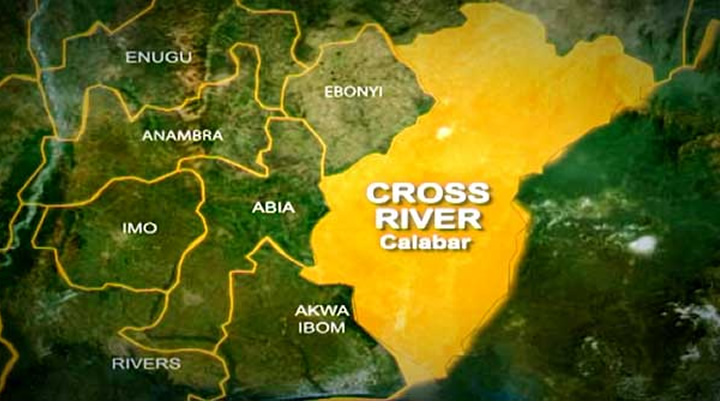
The Cross River State House of Assembly has initiated the process to amend the Local Government Law 2007, introducing provisions to expand political appointments and enhance local government administration across the state.
The bill, sponsored by Rt. Hon. Davies Etta, representing Abi State Constituency, was debated on Tuesday in Calabar.
It proposes increasing the number of appointees in each Local Government Area (LGA) to 50. Among the new roles are 16 Special Adviser positions and a cadre of officials known as Ward Relation Officers.
According to the bill, “The Chairman of Council may appoint such a number of Special Advisers to assist him in the discharge of his duties, provided that appointments, when added to other statutory appointments, shall not exceed a total number of 50.”
The proposed Ward Relation Officers will hold ranks equivalent to Special Advisers and will report directly to the Chairmen of their respective LGAs.
This move, the Assembly says, is aimed at fostering grassroots engagement and improving governance at the local level.
Another key provision of the bill seeks to elevate the office of the Head of Local Government Administration (HOLGA) to the status of a Permanent Secretary within the state public service.
The amendment stipulates that HOLGAs will enjoy all the rights, privileges, and entitlements of Permanent Secretaries, including pensions.
“The office of the HOLGA shall be equivalent to the office of a Permanent Secretary of the State Public Service and shall enjoy all rights and privileges of the Permanent Secretary, including pensions,” the bill states.
It also specifies that appointments to the HOLGA position must be made exclusively from within the local government service in the state.
The bill, which has passed its first and second readings, has been referred to a joint committee on Local Government Affairs, Judiciary, and Public Accounts for further review and consultations with stakeholders.
Speaker of the Assembly, Rt. Hon. Elvert Ayambem, underscored the importance of the proposed amendment, noting that it would strengthen local government administration and improve service delivery to the grassroots.
The Assembly is expected to hold further deliberations before making a final decision on the proposed amendments.
Politics
Trump Completes Return To White House, As 47th US President

Donald Trump has completed his return to the White House with his inauguration as the 47th President of the United States (POTUS).
Trump’s historic return, on account of adverse weather conditions, happened with a remarkable ceremony at the Capitol Rotunda, on Monday.
In his inaugural address, President Trump outlined a bold agenda for his administration, touching on issues of gender, race, border control, economic reforms, and energy policies.
ALSO READ: CSR: Dangote Awards Scholarships To 473 Students
President Trump asserted that his administration would recognise only two genders — male and female — effectively dismissing identities such as transgender, non-binary, and genderqueer.
President Trump asserted, “This week, I will end the government policy of engineering race and gender into every aspect of public and private life. Henceforth, it will be the official policy of the United States government that there are only two genders: male and female.”
He unveiled plans to overhaul the trade system, introducing an “External Revenue Service” to collect tariffs from foreign countries, promising to shift the economic burden away from U.S. taxpayers.
“I will immediately begin the overhaul of our trade system to protect American workers and families. Instead of taxing our citizens to enrich other countries, we will tariff and tax foreign countries to enrich our citizens,” Trump stated.
The POTUS vowed to make America a “manufacturing nation” again by leveraging the country’s vast oil and gas reserves.
“America will be a manufacturing nation once again. We will use our liquid gold — oil and gas — to bring prices down, fill our reserves, and export energy worldwide. We will end the Green New Deal and revoke the electric vehicle mandate, saving our auto industry,” he said.
On border control, President Trump declared a national emergency at the southern border and announced measures to combat illegal immigration.
“All illegal entry will be halted, and we will begin the process of returning millions of criminal aliens. The Remain in Mexico policy will be reinstated, and catch-and-release practices will end. Troops will secure our borders to repel this invasion,” he announced.
He also pledged to designate cartels as foreign terrorist organizations and invoke the Alien Enemies Act of 1798 to combat criminal networks.
The POTUS announced the formation of a Department of Government Efficiency and outlined measures to tackle inflation and high costs.
He also promised an aggressive crackdown on crime, leveraging federal and state resources to eliminate gang activity.
“As commander-in-chief, I have no higher responsibility than to defend our country from threats and invasions,” President Trump added.
He recounted an assassination attempt during his campaign, framing his survival as a divine sign of his purpose to “make America great again.”
In addition, President Trump criticised America’s healthcare and education systems, promising significant reforms to address inadequacies exposed by recent natural disasters.
The event, attended by lawmakers, distinguished guests, and family members, marked the beginning of President Trump’s second term. Vice President JD Vance was also sworn in, taking the oath of office in a ceremony presided over by Supreme Court Justice Brett Kavanaugh.
It was gathered that earlier in the day, President Trump and Melania Trump met with outgoing President Joe Biden and former First Lady Jill Biden, continuing the tradition of a handover meeting between administrations.
At a pre-inauguration rally, President Trump addressed supporters, promising to pardon January 6 defendants and issuing executive orders on his first day in office.
Despite freezing temperatures, the ceremony proceeded with President Trump expressing confidence in his administration’s vision and America’s future.

